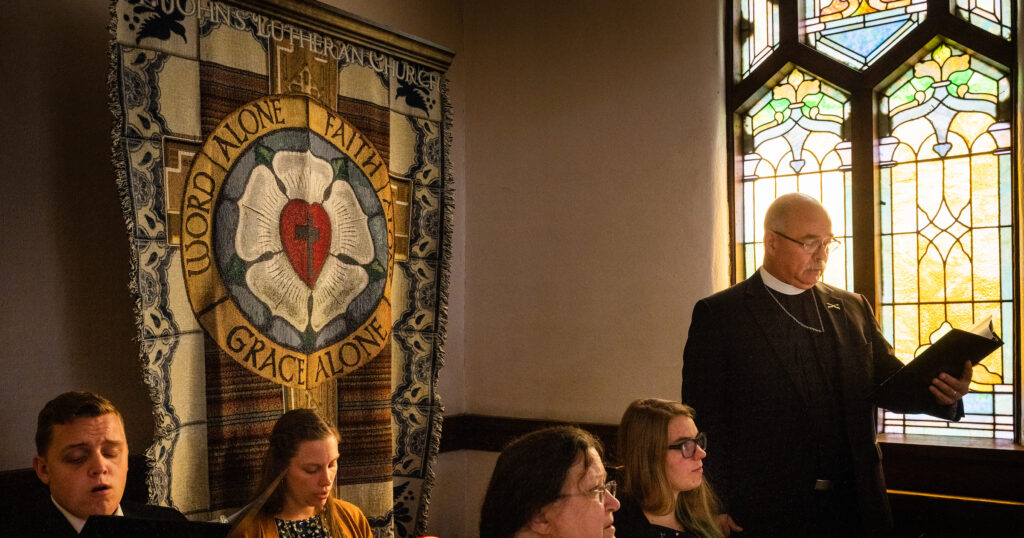By Charles P. Brown
Singing has always been a powerful and integral part of worship. From hymns and psalms to chorales and cantatas, Christians have used music to praise God, teach biblical truths and unite the gathered saints. The role of the pastor in leading music in the Divine Service should not be overlooked. In my youth, there were pastors who sang and inspired me to be active in church music. In fact, even a “tone deaf” pastor greatly influenced my musical participation. A pastor’s encouragement matters.
Does singing matter?
Singing is a form of prayer. When we lift our voices in song, we are offering up our praise, thanks and petitions to God. Pastors regularly lead their congregations in prayer, and singing adds an additional dimension to those prayers. Whether it be through a hymn, the chanting of a psalm or a refrain, music can often touch the heart and soul more deeply than spoken words. When a group of people breathe together and share in song, it fosters a community among God’s people that can be hard to define but is easily understood once experienced.
A pastor’s teaching can also be enhanced through singing. LCMS churches highly value the ability of the liturgy and hymn to speak God’s Word. By actively participating in the music ministry of the church, pastors reinforce these teachings and deepen the congregation’s understanding of the faith. When pastors lead by example, they demonstrate the value of music in worship and instruction.
Me sing?!
Some pastors who have not been trained how to sing may feel reticent to sing in front of the congregation. What then? Know that singing can be learned, and there are numerous ways to improve these skills. The pastor is not alone in this endeavor. When singing or chanting individually in worship, a trusted musician or cantor can provide feedback to further strengthen the pastor for this service. This summer’s Institute on Liturgy, Preaching, and Church Music will also provide opportunities for growth.
As a music professor, I work with students who want to improve their singing in service to God. I have learned that anyone who wants to improve their singing can do so with encouraging instruction and coaching. Though growth and development take time, I have heard significant improvements in people who thought they were tone deaf.
Singing not only benefits us individually here and now. We are also encouraging and preparing the next generation of singing pastors in the church. Even when pastors choose not to sing individually in worship — even pastors who might struggle now to match pitch — they can still demonstrate a willingness to sing. This simple encouragement has lasting rewards.
There are many benefits to be gained from pastors incorporating singing into their ministry. Whether for prayer, communication, self-expression or teaching, singing can help pastors connect with their congregations in meaningful ways. As Martin Luther said, “Next to the Word of God, the noble art of music is the greatest treasure in the world.” An even greater treasure is yet to come: life eternal with the Father, Son and Holy Spirit in the unending song of praise with the heavenly host.
Cover image: LCMS Communications/Erik M. Lunsford






My question is if hymns are prayers why do we not have “AMEN” at the end of them as we used to have????
I was told by Rev. Dr Paul Foelber, professor of Music, Concordia, AnnArbor, a member of the Commission on Worship, who contributed to Luthern Worship Hymnal, that “Amens” were simply added to every hymn in the pew edition of the 1941 Lutheran Hymnal for no particularly good reason…even when the hymn writers did not include them; and so the Commission on Worship for both the green LBW and the blue LW removed them to return to an older practice. It seems that the editors of LSB agreed.
https://music.cph.org/lutheran-service-book/downloads/chart-amens
Singing and chanting truly elevate the words of the liturgy and indeed is a skill that can be learned. They also greatly aid in the memorization of the liturgy. I’m thankful to be at a parish where the Introit, Kyrie, salutation, Gradual, proper preface, the Verba, and Benediction are all chanted.
Unlike the voices in choirs, the solo voice is a very exposed voice. So for a pastor’s solo singing to enhance rather than distract from worship, he will need not only to have a sufficiently pleasing voice and sufficient musical skill. It will also be highly advantageous for him to take sufficient time Sunday morning to warm up his voice well. Yet the pastors I’ve known have tended to be quite preoccupied before services — and rightly so — with several other aspects of worship preparation as well as the greeting of members and visitors. And vocal warmups become increasingly important with age.
When I hear a pastor sing solo who does not sing well for whatever reason, it becomes a thing to be tolerated. Beyond that, I might wonder whether anyone in the congregation has had the courage to give him feedback or whether he has rejected the feedback given. And then my mind is no longer fully attentive to the things of God.
“Having gifts that differ according to the grace given to us, let us use them” (Romans 12:6 ESV). I would imagine that, much like the population at large, a few seminarians and pastors will have a lot of natural musical talent, some will have musical talent that might be developed with a little coaching, and others might be more fruitful in ministry, better stewards of their time, and find greater joy by simply focusing on the development and use of gifts they have that are most evident.
“By this my Father is glorified, that you bear much fruit” (John 15:8 ESV).
It’s fine if a pastor can sing well, and I think anyone who aspires to improve their musical skills should be applauded. But some fine, godly pastors are just plain terrible singers, and it is painful to hear them struggle. I also personally find that pastors chanting can sometimes be an actual distraction from worship, even if they are good singers. I wind up concentrating on how well or poorly he is singing, rather than on the words of the Collect or the Verba, for example. I also find it interesting that none of the NT lists of qualifications for an “elder” (pastor) mentions musical ability. And, yes, I actually prefer more “high” worship.
Just my two cents.